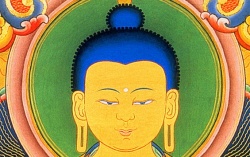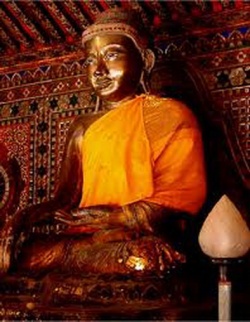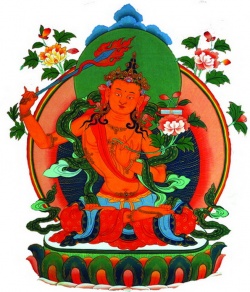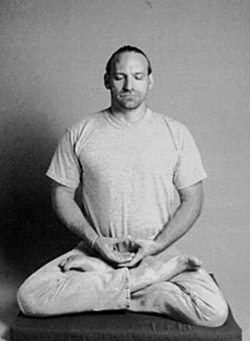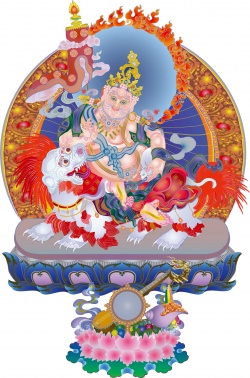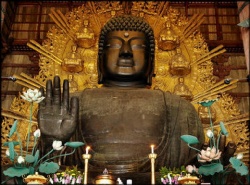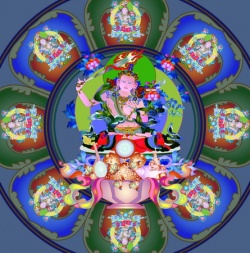Difference between revisions of "Explanation of the Mandala Offering"
m (Text replacement - "lang" to "lang") |
|||
| (One intermediate revision by the same user not shown) | |||
| Line 1: | Line 1: | ||
{{DisplayImages|323|473|71|1300|1231|169|759|240}} | {{DisplayImages|323|473|71|1300|1231|169|759|240}} | ||
<poem> | <poem> | ||
| − | + | ||
| − | |||
| − | The life-story of [[Lama]] [[Tsong Khapa]] also shows us the importance of this practice. After he had received many teachings on [[sutra]] and [[tantra]] from various [[gurus]], [[Tsong Khapa]] asked the great [[Manjushri]] many important questions through one of his [[gurus]], [[Lama]] Omapa. He questioned him on profound [[subjects]] in the practice of [[tantra]], such as {{Wiki|subtle}} [[emptiness]] and the [[illusory body]]. [[Manjushri]] advised [[Tsong Khapa]] to leave [[scholarly]] [[activities]] and to do {{Wiki|solitary}} practice for the purpose of [[purification]] and increasing [[merit]]. | + | |
| + | |||
| + | |||
| + | |||
| + | |||
| + | |||
| + | |||
| + | |||
| + | All [[experienced]] [[yogis]] find the [[mandala offering]] a very important practice for gaining [[merit]]. We need this so that we can easily gain the [[experience]] of whatever aspect of the [[path]] we [[meditate]] on. | ||
| + | |||
| + | Once, [[Atisha’s]] chief [[disciple]], [[Dromton]] [[Rinpoche]], went to visit one of his [[own]] main [[disciples]], Gonba Rinchen. When he arrived, [[Dromton]] found that the [[mandala]] [[objects]] were covered by dust in the corner of the [[meditation]] room. This made him [[unhappy]] and he scolded Gonba Rinchen, saying, `Why aren’t you practising [[mandala offering]]?’ Gonba Rinchen answered respectfully, `Today I forgot to offer the [[mandala]] because I was deeply involved in my [[meditation]].’ [[Dromton]] [[Rinpoche]] started laughing and said, `Are you a better [[meditator]] than [[Atisha]]? Although he has reached very high realizations, he still never forgets the practice of [[offering]] the [[mandala]] every day!’ | ||
| + | |||
| + | The life-story of [[Lama]] [[Tsong Khapa]] also shows us the importance of this practice. After he had received many teachings on [[sutra]] and [[tantra]] from various [[gurus]], [[Tsong Khapa]] asked the great [[Manjushri]] many important questions through one of his [[gurus]], [[Lama]] Omapa. He questioned him on profound [[subjects]] in the practice of [[tantra]], such as {{Wiki|subtle}} [[emptiness]] and the [[illusory body]]. [[Manjushri]] advised [[Tsong Khapa]] to leave [[scholarly]] [[activities]] and to do {{Wiki|solitary}} practice for the {{Wiki|purpose}} of [[purification]] and increasing [[merit]]. | ||
As [[Manjushri]] advised, the great [[Tsong Khapa]] went to a {{Wiki|solitary}} place in [[South]] [[Tibet]] called Oka. There, for many years, he single-pointedly dedicated his [[life]] to [[purification]] and the practice of [[offering]] the [[mandala]]. As a result, without much [[effort]], [[Tsong Khapa]] later gained many higher realizations on both the [[sutra]] and [[highest]] [[tantra]] [[paths]]. | As [[Manjushri]] advised, the great [[Tsong Khapa]] went to a {{Wiki|solitary}} place in [[South]] [[Tibet]] called Oka. There, for many years, he single-pointedly dedicated his [[life]] to [[purification]] and the practice of [[offering]] the [[mandala]]. As a result, without much [[effort]], [[Tsong Khapa]] later gained many higher realizations on both the [[sutra]] and [[highest]] [[tantra]] [[paths]]. | ||
| Line 11: | Line 22: | ||
[[Pabongka Rinpoche]] often said: | [[Pabongka Rinpoche]] often said: | ||
| − | As [[Lord Buddha]] clearly prophesied, the great [[Tsong Khapa]] had already attained [[enlightenment]] many [[aeons]] ago. He had no need to {{Wiki|purify}} [[negative actions]]. However, to set us a good example, he showed that even after he had reached the [[highest]] realizations, he still practised the prerequisites of [[purification]] and [[accumulation of merit]]. | + | As [[Lord Buddha]] clearly prophesied, the great [[Tsong Khapa]] had already [[attained]] [[enlightenment]] many [[aeons]] ago. He had no need to {{Wiki|purify}} [[negative actions]]. However, to set us a good example, he showed that even after he had reached the [[highest]] realizations, he still practised the prerequisites of [[purification]] and [[accumulation of merit]]. |
There are three kinds of [[mandala offering]]: external, internal and secret. The last two are related to the practice of [[tantric]] [[meditation]]. The [[mandala offering]] that we practise here, the external one, is based on [[sutra]] practice. | There are three kinds of [[mandala offering]]: external, internal and secret. The last two are related to the practice of [[tantric]] [[meditation]]. The [[mandala offering]] that we practise here, the external one, is based on [[sutra]] practice. | ||
| Line 21: | Line 32: | ||
How to Offer a [[Mandala]] | How to Offer a [[Mandala]] | ||
| − | [[Traditionally]], when we perform this [[mandala offering]], we use a [[mandala]] base, three or four rings placed on top of each other, a top, grain and, if we have any, semi-precious stones to pile up on the [[mandala]] base. All these [[symbolize]] our [[offering]] the [[universe]] as described in the [[Mandala Offering]] [[Prayer]]. The important thing in this practice is to [[visualize]] as clearly as possible the whole structure of the [[universe]] and the [[precious]] [[offerings]] as they are described. | + | [[Traditionally]], when we perform this [[mandala offering]], we use a [[mandala]] base, three or four rings placed on top of each other, a top, grain and, if we have any, semi-precious stones to pile up on the [[mandala]] base. All these [[symbolize]] our [[offering]] the [[universe]] as described in the [[Mandala Offering]] [[Prayer]]. The important thing in this practice is to [[visualize]] as clearly as possible the whole {{Wiki|structure}} of the [[universe]] and the [[precious]] [[offerings]] as they are described. |
| − | The base [[symbolizes]] the golden ground of the [[world]] system; the first ring is the {{Wiki|iron}} fence and the continents; the top two or three rings represent the levels of [[Mount Meru]] above the ocean; the [[mandala]] top [[symbolizes]] the [[precious]] things in the whole [[universe]], as well as our own inner [[virtues]], which we offer. Having built the [[mandala offering]] on the base, we hold it at the level of our [[heart]]. Our left and right hands [[symbolize]] [[Brahma]] and [[Indra]], who are considered to be the most powerful [[symbolic]] [[kings]] of the [[universe]]. | + | The base [[symbolizes]] the golden ground of the [[world]] system; the first ring is the {{Wiki|iron}} fence and the continents; the top two or three rings represent the levels of [[Mount Meru]] above the ocean; the [[mandala]] top [[symbolizes]] the [[precious]] things in the whole [[universe]], as well as our [[own]] inner [[virtues]], which we offer. Having built the [[mandala offering]] on the base, we hold it at the level of our [[heart]]. Our left and right hands [[symbolize]] [[Brahma]] and [[Indra]], who are considered to be the most powerful [[symbolic]] [[kings]] of the [[universe]]. |
| − | To build the [[mandala]] (see illustration on page 67), first take some grain in your left hand and hold the [[mandala]] base. Take some grain with your right hand and put it on the base. Then wipe it with your right forearm in a {{Wiki|clockwise}} [[direction]], tipping the grain away from you. Repeat this three times, [[visualizing]] that you are purifying your incorrect [[motivation]]. Then put more grain on the base and wipe it in an anti-clockwise [[direction]] three times, tipping the grain towards yourself. At the same [[time]] [[visualize]] that you are receiving great [[blessings]] from the [[merit field]] to open your [[mind]] so that you can offer the [[mandala]] from your [[heart]]. | + | [[To build]] the [[mandala]] (see illustration on page 67), first take some grain in your left hand and hold the [[mandala]] base. Take some grain with your right hand and put it on the base. Then wipe it with your right forearm in a {{Wiki|clockwise}} [[direction]], tipping the grain away from you. Repeat this three times, [[visualizing]] that you are purifying your incorrect [[motivation]]. Then put more grain on the base and wipe it in an anti-clockwise [[direction]] three times, tipping the grain towards yourself. At the same [[time]] [[visualize]] that you are receiving great [[blessings]] from the [[merit field]] to open your [[mind]] so that you can offer the [[mandala]] from your [[heart]]. |
Then spread some grain over the base. This [[symbolizes]] covering the golden ground with [[precious]] [[jewels]]. While doing this, recite the [[mantra]] om [[vajra]] bhurni [[ah]] hung meaning `[[indestructible]] ground.’ This is the [[mantra]] for [[blessing]] the ground of the [[universe]]. | Then spread some grain over the base. This [[symbolizes]] covering the golden ground with [[precious]] [[jewels]]. While doing this, recite the [[mantra]] om [[vajra]] bhurni [[ah]] hung meaning `[[indestructible]] ground.’ This is the [[mantra]] for [[blessing]] the ground of the [[universe]]. | ||
| Line 31: | Line 42: | ||
Then place the first ring on the base. Take more grain with the right hand and sprinkle it around the inside of the ring, reciting the [[mantra]] om [[vajra]] rekhe [[ah]] hung. The ring and the sprinkling of grain [[symbolize]] [[blessing]] the {{Wiki|iron}} fence that encircles the [[universe]]. Next, pile some grain in the middle of the base (1). This [[symbolizes]] [[Mount Meru]] and the seven golden mountain chains around it. | Then place the first ring on the base. Take more grain with the right hand and sprinkle it around the inside of the ring, reciting the [[mantra]] om [[vajra]] rekhe [[ah]] hung. The ring and the sprinkling of grain [[symbolize]] [[blessing]] the {{Wiki|iron}} fence that encircles the [[universe]]. Next, pile some grain in the middle of the base (1). This [[symbolizes]] [[Mount Meru]] and the seven golden mountain chains around it. | ||
| − | Then put some grain in the [[east]] of the base (2). There are two systems of where the [[east]] is held: either on our side of the base or on the side of the [[merit field]], whichever we choose. If we perform the [[mandala offering]] with the aim of receiving [[blessing]] power from the [[merit field]], then the [[east]] is held on our side. And if we perform it with the purpose of accumulating [[merit]], then the [[east]] is held on the side of the [[merit field]]. Having put grain in the [[east]], we then put some in the [[south]] (3), [[west]] (4) and [[north]] (5). These four points [[symbolize]] the four major continents around [[Mount Meru]]. Now put some grain at each side of the eastern continent (6, 7), then likewise to each side of the other continents to [[symbolize]] the eight sub-continents or islands (8 – 13). | + | Then put some grain in the [[east]] of the base (2). There are two systems of where the [[east]] is held: either on our side of the base or on the side of the [[merit field]], whichever we choose. If we perform the [[mandala offering]] with the aim of receiving [[blessing]] power from the [[merit field]], then the [[east]] is held on our side. And if we perform it with the {{Wiki|purpose}} of accumulating [[merit]], then the [[east]] is held on the side of the [[merit field]]. Having put grain in the [[east]], we then put some in the [[south]] (3), [[west]] (4) and [[north]] (5). These four points [[symbolize]] the four major continents around [[Mount Meru]]. Now put some grain at each side of the [[eastern continent]] (6, 7), then likewise to each side of the other continents to [[symbolize]] the eight sub-continents or islands (8 – 13). |
| − | The next step is to build the [[visualization]] of the four unique [[precious]] things that are contained on the [[four continents]]. They are: in the [[east]] the [[precious]] mountain (14), in the [[south]] the [[precious]] [[tree]] (15), in the [[west]] the [[precious]] {{Wiki|cow}} (16) and in the [[north]] the naturally growing [[precious]] crops (17). To [[symbolize]] these four we put grain in each of these places. | + | The next step is [[to build]] the [[visualization]] of the four unique [[precious]] things that are contained on the [[four continents]]. They are: in the [[east]] the [[precious]] mountain (14), in the [[south]] the [[precious]] [[tree]] (15), in the [[west]] the [[precious]] {{Wiki|cow}} (16) and in the [[north]] the naturally growing [[precious]] crops (17). To [[symbolize]] these four we put grain in each of these places. |
| − | After this we build the [[visualization]] of the eight [[precious]] [[objects]] belonging to a [[wheel-turning king]] who rules the [[four continents]]. Place the second ring on the top of the first ring that is already filled with grain. Beginning in the [[east]] (18), put some grain in the eight [[directions]] inside the second ring (18-25). These [[symbolize]] the eight [[precious]] things: the seven [[auspicious]] {{Wiki|royal}} [[objects]] plus the great [[treasure vase]], as described in the [[prayer]]. They are [[visualized]] in the [[space]] above the continents and islands around [[Mount Meru]]. | + | After this we build the [[visualization]] of the eight [[precious]] [[objects]] belonging to a [[wheel-turning king]] who {{Wiki|rules}} the [[four continents]]. Place the second ring on the top of the first ring that is already filled with grain. Beginning in the [[east]] (18), put some grain in the eight [[directions]] inside the second ring (18-25). These [[symbolize]] the eight [[precious]] things: the seven [[auspicious]] {{Wiki|royal}} [[objects]] plus the great [[treasure vase]], as described in the [[prayer]]. They are [[visualized]] in the [[space]] above the continents and islands around [[Mount Meru]]. |
If we are using three rings we continue on the second ring | If we are using three rings we continue on the second ring | ||
here, but if we are using four rings we put the third ring on here and then put grain in the eight [[directions]] again (26-33). These [[symbolize]] the eight [[goddesses]] carrying eight different types of [[offerings]]. These [[offerings]] are [[visualized]] on the four levels of [[Mount Meru]] above the sea. | here, but if we are using four rings we put the third ring on here and then put grain in the eight [[directions]] again (26-33). These [[symbolize]] the eight [[goddesses]] carrying eight different types of [[offerings]]. These [[offerings]] are [[visualized]] on the four levels of [[Mount Meru]] above the sea. | ||
| − | Now place the last ring on the grain and inside it put some grain towards your left and right hand (34, 35), [[symbolizing]] the {{Wiki|sun}} and [[moon]]. Then put some grain away from you and towards you (36, 37), [[symbolizing]] the [[protection]] [[umbrella]] and [[victory banner]]. The [[victory banner]] [[symbolizes]] victory over inner [[evil]]. As we generally make [[mandala]] [[offerings]] mainly for the purpose of receiving [[blessing]] power from the [[Buddhas]] and [[Bodhisattvas]], we normally place the [[banner]] of victory towards us. If, however, we [[feel]] there is some obstacle to our [[meditation]] practice, it is suggested that we put the [[protection]] [[umbrella]] towards us – this [[symbolizes]] receiving [[protection]] from the [[Buddhas]] and [[Bodhisattvas]]. | + | Now place the last ring on the grain and inside it put some grain towards your left and right hand (34, 35), [[symbolizing]] the {{Wiki|sun}} and [[moon]]. Then put some grain away from you and towards you (36, 37), [[symbolizing]] the [[protection]] [[umbrella]] and [[victory banner]]. The [[victory banner]] [[symbolizes]] victory over inner [[evil]]. As we generally make [[mandala]] [[offerings]] mainly for the {{Wiki|purpose}} of receiving [[blessing]] power from the [[Buddhas]] and [[Bodhisattvas]], we normally place the [[banner]] of victory towards us. If, however, we [[feel]] there is some [[obstacle]] to our [[meditation]] practice, it is suggested that we put the [[protection]] [[umbrella]] towards us – this [[symbolizes]] receiving [[protection]] from the [[Buddhas]] and [[Bodhisattvas]]. |
| − | Finally place the [[mandala]] top in the middle (38). This [[symbolizes]] the [[offerings]] of [[Samantabhadra]]. We [[visualize]] on the top of [[Mount Meru]] an enormous [[precious]] [[tree]] with many branches spreading throughout [[space]]. On each branch is the [[Bodhisattva]] [[Samantabhadra]], creating from his [[concentration]] power innumerable priceless [[offerings]] to the [[Buddhas]] and [[Bodhisattvas]] that we [[visualize]] in the [[merit field]]. | + | Finally place the [[mandala]] top in the middle (38). This [[symbolizes]] the [[offerings]] of [[Samantabhadra]]. We [[visualize]] on the top of [[Mount Meru]] an enormous [[precious]] [[tree]] with many branches spreading throughout [[space]]. On each branch is the [[Bodhisattva]] [[Samantabhadra]], creating from his [[concentration]] power {{Wiki|innumerable}} priceless [[offerings]] to the [[Buddhas]] and [[Bodhisattvas]] that we [[visualize]] in the [[merit field]]. |
We then [[transform]] the entire [[universe]] that we have [[visualized]] into a [[pure]] [[universe]]. Holding the [[mandala]] at our [[heart]], we offer it to the [[merit field]]. | We then [[transform]] the entire [[universe]] that we have [[visualized]] into a [[pure]] [[universe]]. Holding the [[mandala]] at our [[heart]], we offer it to the [[merit field]]. | ||
| Line 49: | Line 60: | ||
Still holding the [[mandala]] at our [[heart]], we make requests to the [[Buddhas]] and [[Bodhisattvas]] to bless our [[mind]] to be able to achieve the [[realization]] of the [[path]] we are [[meditating]] on, as follows: | Still holding the [[mandala]] at our [[heart]], we make requests to the [[Buddhas]] and [[Bodhisattvas]] to bless our [[mind]] to be able to achieve the [[realization]] of the [[path]] we are [[meditating]] on, as follows: | ||
| − | O [[Buddhas]] and [[Bodhisattvas]], please bestow your [[boundless]] [[compassion]], stainless [[wisdom]] and limitless power upon me, so that I may quickly gain [[realization]] of the [[path]] I am [[meditating]] on, in order to attain [[enlightenment]] for the sake of all my mother [[sentient beings]]. | + | O [[Buddhas]] and [[Bodhisattvas]], please bestow your [[boundless]] [[compassion]], stainless [[wisdom]] and [[limitless]] power upon me, so that I may quickly gain [[realization]] of the [[path]] I am [[meditating]] on, in order to attain [[enlightenment]] for the [[sake]] of all my mother [[sentient beings]]. |
Having made our request, we tip the grain towards us [[thinking]] that we are receiving their [[blessings]]. [[Visualize]] that from their hearts [[emanate]] brilliant white [[light]] and [[nectar]], which enter through our [[crown chakra]], completely filling our [[body]] and [[mind]] and purifying all {{Wiki|obstacles}} formed by our negative [[karmas]] and [[delusions]] that hinder us from gaining realizations. | Having made our request, we tip the grain towards us [[thinking]] that we are receiving their [[blessings]]. [[Visualize]] that from their hearts [[emanate]] brilliant white [[light]] and [[nectar]], which enter through our [[crown chakra]], completely filling our [[body]] and [[mind]] and purifying all {{Wiki|obstacles}} formed by our negative [[karmas]] and [[delusions]] that hinder us from gaining realizations. | ||
| − | Then all other [[Buddhas]], [[Bodhisattvas]], [[deities]], [[Arhats]], [[dakas]], [[dakinis]], [[Dharma protectors]] gradually dissolve into [[Buddha Shakyamuni]], who is inseparable from your own [[guru]]. Finally, [[Buddha Shakyamuni]] comes above your head. In his [[heart]], [[visualize]] a [[moon]] disc surrounded by the syllables of his [[mantra]]: om muni muni mahamuniye [[svaha]]. Recite this one hundred times. Outside this [[mantra]] is the [[mantra]] of [[Tsong Khapa]], which represents the [[mantra]] of your own [[guru]]: om [[ah]] [[guru]] [[vajradhara]] [[sumati]] kiti [[siddhi]] hung hung. Recite this one hundred times, too. | + | Then all other [[Buddhas]], [[Bodhisattvas]], [[deities]], [[Arhats]], [[dakas]], [[dakinis]], [[Dharma protectors]] gradually dissolve into [[Buddha Shakyamuni]], who is [[inseparable]] from your [[own]] [[guru]]. Finally, [[Buddha Shakyamuni]] comes above your head. In his [[heart]], [[visualize]] a [[moon]] disc surrounded by the {{Wiki|syllables}} of his [[mantra]]: om muni muni mahamuniye [[svaha]]. Recite this one hundred times. Outside this [[mantra]] is the [[mantra]] of [[Tsong Khapa]], which represents the [[mantra]] of your [[own]] [[guru]]: om [[ah]] [[guru]] [[vajradhara]] [[sumati]] kiti [[siddhi]] hung hung. Recite this one hundred times, too. |
| − | At this point we do the actual [[meditation]] on whatever aspect of the [[path]] we are contemplating. When the [[meditation]] is over, we dissolve the [[merit field]] as follows: [[visualize]] your [[heart]] in the [[form]] of an open [[lotus]]; then [[Guru]] [[Shakyamuni]] descends through your [[crown chakra]] into your [[body]] and sits inside the [[lotus]]. Think that he becomes inseparable from your [[mind]]. | + | At this point we do the actual [[meditation]] on whatever aspect of the [[path]] we are [[contemplating]]. When the [[meditation]] is over, we dissolve the [[merit field]] as follows: [[visualize]] your [[heart]] in the [[form]] of an open [[lotus]]; then [[Guru]] [[Shakyamuni]] descends through your [[crown chakra]] into your [[body]] and sits inside the [[lotus]]. Think that he becomes [[inseparable]] from your [[mind]]. |
To sum up: this [[tradition]] of practising the [[gradual path]] to [[enlightenment]] has two stages: the preparation stage, which consists of the six [[preliminary practices]], and the actual [[meditation]]. This system should be applied to all practices of [[meditation]] on the [[path]], from [[meditation]] on the [[precious]] [[human]] [[rebirth]] to [[meditation]] on [[emptiness]]. | To sum up: this [[tradition]] of practising the [[gradual path]] to [[enlightenment]] has two stages: the preparation stage, which consists of the six [[preliminary practices]], and the actual [[meditation]]. This system should be applied to all practices of [[meditation]] on the [[path]], from [[meditation]] on the [[precious]] [[human]] [[rebirth]] to [[meditation]] on [[emptiness]]. | ||
| Line 67: | Line 78: | ||
wang [[chen]] ser gyi sa zhi | wang [[chen]] ser gyi sa zhi | ||
Om [[vajra]] rekhe [[ah]] hung | Om [[vajra]] rekhe [[ah]] hung | ||
| − | [[chi]] chag ri kor yug gyi [[kor wa]] u su | + | [[chi]] [[chag]] ri kor yug gyi [[kor wa]] u su |
| − | ri gyal po [[ri rab]] (1) | + | ri [[gyal]] po [[ri rab]] (1) |
| − | shar lu pag po (2) | + | [[shar]] lu pag po (2) |
| − | lho dzam bu ling(3) | + | [[lho]] dzam bu ling(3) |
nub ba lang [[chi]] (4) | nub ba lang [[chi]] (4) | ||
[[jang]] dra mi nyan (5) | [[jang]] dra mi nyan (5) | ||
| Line 78: | Line 89: | ||
dang dra mi nyan gyi da (13) | dang dra mi nyan gyi da (13) | ||
[[rinpoche]] ri wo (14) | [[rinpoche]] ri wo (14) | ||
| − | pag sam gyi shing (15) | + | pag sam gyi [[shing]] (15) |
do jo ba (16) | do jo ba (16) | ||
| − | [[ma mo]] pa yi lo tog (17) | + | [[ma mo]] [[pa yi]] lo tog (17) |
| − | Kor lo rin po che (18) | + | Kor lo [[rin po che]] (18) |
| − | norbu rin po che (19) | + | norbu [[rin po che]] (19) |
| − | tzun mo rin po che (20) | + | tzun mo [[rin po che]] (20) |
| − | lon po rin po che (21) | + | lon po [[rin po che]] (21) |
| − | lang po rin po che (22) | + | lang po [[rin po che]] (22) |
| − | ta chog rin po che (23) | + | ta chog [[rin po che]] (23) |
| − | mag po rin po che (24) | + | mag po [[rin po che]] (24) |
ter [[chen po]] yi [[bum pa]] (25) | ter [[chen po]] yi [[bum pa]] (25) | ||
[[Geg]] ma (26) treng wa ma (27) | [[Geg]] ma (26) treng wa ma (27) | ||
| − | lu ma (28) [[gar ma]] (29) [[me tog ma]] (30) dug po ma (31) | + | lu ma (28) [[gar ma]] (29) [[me tog ma]] (30) [[dug po]] ma (31) |
[[nang]] sal ma (32) [[dri chab ma]] (33) | [[nang]] sal ma (32) [[dri chab ma]] (33) | ||
| − | [[Nyi ma]] (34) da wa (35) rin po che dug (36) | + | [[Nyi ma]] (34) da wa (35) [[rin po che]] dug (36) |
| − | chog la nam par gya wa gyal [[tsan]] (37) | + | chog la nam par [[gya]] wa [[gyal]] [[tsan]] (37) |
| − | u su lha dang mi pal jor pun sum [[tsog]] pa (38) | + | u su [[lha]] dang mi pal jor pun sum [[tsog]] pa (38) |
| − | Ma [[tsang]] wa me pa tzang zhing yid du wong wa di dag drin [[chen]] tza wa dang gyu par cha pd pal dan [[lama]] dam pa nam dang kye per du yang [[lama]] sha kya thub pa | + | Ma [[tsang]] wa me pa tzang [[zhing]] yid du wong wa di dag drin [[chen]] tza wa dang gyu par cha pd pal dan [[lama]] [[dam pa]] nam dang kye per du [[yang]] [[lama]] sha kya [[thub pa]] |
| − | lha [[tsog]] kor dang cha pa nam la zhing gam ul [[war]] gyio | + | [[lha]] [[tsog]] kor dang cha pa nam la [[zhing]] gam ul [[war]] gyio |
Tug je [[dro]] way don du zhe su sol zhe nay dag sog [[dro]] wa mar gyur nam kay ta dang [[nyam]] pay sem [[chen]] tam chay la tug tsay wa [[chen]] pi go nay jin gyi lab tu sol. | Tug je [[dro]] way don du zhe su sol zhe nay dag sog [[dro]] wa mar gyur nam kay ta dang [[nyam]] pay sem [[chen]] tam chay la tug tsay wa [[chen]] pi go nay jin gyi lab tu sol. | ||
Om [[vajra]] [[bhumi]] [[ah]] hung, greatly powerful golden ground. | Om [[vajra]] [[bhumi]] [[ah]] hung, greatly powerful golden ground. | ||
| − | Om [[vajra]] rekhe [[ah]] hung, at the outermost limit a circular {{Wiki|iron}} mountain chain surrounds [[Mount Meru]], [[king]] of mountains (1). | + | Om [[vajra]] rekhe [[ah]] hung, at the outermost limit a circular {{Wiki|iron}} mountain chain surrounds [[Mount Meru]], [[king]] of [[mountains]] (1). |
In the [[east]] is the continent Lupagpo (2) | In the [[east]] is the continent Lupagpo (2) | ||
In the [[south]] the continent [[Dzambuling]] (3) | In the [[south]] the continent [[Dzambuling]] (3) | ||
| − | In the [[west]] the continent Balangcho (4) | + | In the [[west]] the continent [[Balangcho]] (4) |
| − | In the [[north]] the continent Draminyan (5) | + | In the [[north]] the continent [[Draminyan]] (5) |
| − | At the two sides of the eastern continent are two subcontinents Lu (6) | + | At the two sides of the [[eastern continent]] are [[two subcontinents]] Lu (6) |
| − | and Lupag (7) At the two sides of the southern continent are two subcontinents Ngayab (8) and Ngayabzhan (9) | + | and [[Lupag]] (7) At the two sides of the [[southern continent]] are [[two subcontinents]] [[Ngayab]] (8) and [[Ngayabzhan]] (9) |
| − | At the two sides of the {{Wiki|western}} continent are two subcontinents Yoden (10) and Lamchogdro (11) At the sides of the northern continent are two sub-continents Draminyan (12) and Draminyangyida (13). | + | At the two sides of the {{Wiki|western}} continent are [[two subcontinents]] [[Yoden]] (10) and Lamchogdro (11) At the sides of the [[northern continent]] are two sub-continents [[Draminyan]] (12) and Draminyangyida (13). |
[[Precious]] mountain (14), wish-granting [[tree]] (15), wishfulfilling {{Wiki|cow}} (16) and uncultivated crops (17). | [[Precious]] mountain (14), wish-granting [[tree]] (15), wishfulfilling {{Wiki|cow}} (16) and uncultivated crops (17). | ||
[[Precious]] [[wheel]] (18), [[precious]] [[jewel]] (19), [[precious]] [[Wikipedia:Queen consort|queen]] (20), | [[Precious]] [[wheel]] (18), [[precious]] [[jewel]] (19), [[precious]] [[Wikipedia:Queen consort|queen]] (20), | ||
| − | [[Precious]] minister (21), [[precious]] [[elephant]] (22), [[precious]] [[horse]] (a3), | + | [[Precious]] [[minister]] (21), [[precious]] [[elephant]] (22), [[precious]] [[horse]] (a3), |
[[Precious]] general (24) and great [[treasure vase]] (25). | [[Precious]] general (24) and great [[treasure vase]] (25). | ||
| − | The [[goddess]] of grace (26), [[goddess]] of garlands (27), [[goddess]] of song (a8), [[goddess]] of dance (29), [[goddess]] of [[flowers]] (30), [[goddess]] of [[incense]] (31), [[goddess]] of [[light]] (32) and [[goddess]] of perfume (33).Sun (34), [[moon]] (35), [[precious]] [[umbrella]] (36) and [[banner]] of victory in every [[direction]] (37), And in the centre, all the {{Wiki|prosperity}} and possessions of [[gods]] and [[humans]] (38). | + | The [[goddess]] of grace (26), [[goddess]] of garlands (27), [[goddess]] of song (a8), [[goddess]] of [[dance]] (29), [[goddess]] of [[flowers]] (30), [[goddess]] of [[incense]] (31), [[goddess]] of [[light]] (32) and [[goddess]] of [[perfume]] (33).Sun (34), [[moon]] (35), [[precious]] [[umbrella]] (36) and [[banner]] of victory in every [[direction]] (37), And in the centre, all the {{Wiki|prosperity}} and possessions of [[gods]] and [[humans]] (38). |
| − | This magnificent and glorious collection, encompassing all {{Wiki|prosperity}} and goodness, I offer to you, my most kind [[root Guru]], To all other {{Wiki|holy}} [[lineage]] [[gurus]], In particular to you, [[Buddha Shakyamuni]], Together with the entire assembly of the [[merit field]]. | + | This magnificent and glorious collection, encompassing all {{Wiki|prosperity}} and [[goodness]], I offer to you, my most kind [[root Guru]], To all other {{Wiki|holy}} [[lineage]] [[gurus]], In particular to you, [[Buddha Shakyamuni]], Together with the entire assembly of the [[merit field]]. |
Please accept this [[offering]] for the {{Wiki|welfare}} of all [[sentient beings]], | Please accept this [[offering]] for the {{Wiki|welfare}} of all [[sentient beings]], | ||
| Line 121: | Line 132: | ||
SHORT [[MANDALA]] [[OFFERING]] | SHORT [[MANDALA]] [[OFFERING]] | ||
| − | Sa zhi pu kyi jug shing me tog tram | + | Sa zhi pu kyi jug [[shing]] [[me tog]] tram |
| − | [[ri rab]] [[ling shi]] nyi da gyan pa di | + | [[ri rab]] [[ling shi]] nyi da [[gyan]] pa di |
| − | [[sang]] gya shing du mig te ul [[war]] gyi | + | [[sang]] [[gya]] [[shing]] du mig te ul [[war]] gyi |
| − | [[dro]] kun nam dag zhing la cho par shog | + | [[dro]] kun nam [[dag zhing]] la cho par shog |
Idam [[guru]] [[ratna]] mandalakam niryatayami | Idam [[guru]] [[ratna]] mandalakam niryatayami | ||
Latest revision as of 12:10, 18 February 2022
<poem>
All experienced yogis find the mandala offering a very important practice for gaining merit. We need this so that we can easily gain the experience of whatever aspect of the path we meditate on.
Once, Atisha’s chief disciple, Dromton Rinpoche, went to visit one of his own main disciples, Gonba Rinchen. When he arrived, Dromton found that the mandala objects were covered by dust in the corner of the meditation room. This made him unhappy and he scolded Gonba Rinchen, saying, `Why aren’t you practising mandala offering?’ Gonba Rinchen answered respectfully, `Today I forgot to offer the mandala because I was deeply involved in my meditation.’ Dromton Rinpoche started laughing and said, `Are you a better meditator than Atisha? Although he has reached very high realizations, he still never forgets the practice of offering the mandala every day!’
The life-story of Lama Tsong Khapa also shows us the importance of this practice. After he had received many teachings on sutra and tantra from various gurus, Tsong Khapa asked the great Manjushri many important questions through one of his gurus, Lama Omapa. He questioned him on profound subjects in the practice of tantra, such as subtle emptiness and the illusory body. Manjushri advised Tsong Khapa to leave scholarly activities and to do solitary practice for the purpose of purification and increasing merit.
As Manjushri advised, the great Tsong Khapa went to a solitary place in South Tibet called Oka. There, for many years, he single-pointedly dedicated his life to purification and the practice of offering the mandala. As a result, without much effort, Tsong Khapa later gained many higher realizations on both the sutra and highest tantra paths.
Pabongka Rinpoche often said:
As Lord Buddha clearly prophesied, the great Tsong Khapa had already attained enlightenment many aeons ago. He had no need to purify negative actions. However, to set us a good example, he showed that even after he had reached the highest realizations, he still practised the prerequisites of purification and accumulation of merit.
There are three kinds of mandala offering: external, internal and secret. The last two are related to the practice of tantric meditation. The mandala offering that we practise here, the external one, is based on sutra practice.
This mandala offering is the symbolic offering of the prosperity of the whole universe. Therefore, every possible offering we can make is contained in it. For this reason, it is considered a very effective method of accumulating merit. The visualization of the universe, which is generated in this mandala offering, is based on the description of the universe given in traditional Buddhist cosmology.
According to this world system, the centre of the universe is Mount Meru, surrounded by seven golden mountain chains. Mount Meru has eight levels of ground, four of which are below the ocean and four above it. On the highest level is the palace of Indra, king of the gods in the desire realm. On the great ocean around Mount Meru are four continents and eight sub-continents. The great ocean rests on a golden ground and is surrounded by an iron fence. The sun and moon rotate in space around Mount Meru above the continents.
How to Offer a Mandala
Traditionally, when we perform this mandala offering, we use a mandala base, three or four rings placed on top of each other, a top, grain and, if we have any, semi-precious stones to pile up on the mandala base. All these symbolize our offering the universe as described in the Mandala Offering Prayer. The important thing in this practice is to visualize as clearly as possible the whole structure of the universe and the precious offerings as they are described.
The base symbolizes the golden ground of the world system; the first ring is the iron fence and the continents; the top two or three rings represent the levels of Mount Meru above the ocean; the mandala top symbolizes the precious things in the whole universe, as well as our own inner virtues, which we offer. Having built the mandala offering on the base, we hold it at the level of our heart. Our left and right hands symbolize Brahma and Indra, who are considered to be the most powerful symbolic kings of the universe.
To build the mandala (see illustration on page 67), first take some grain in your left hand and hold the mandala base. Take some grain with your right hand and put it on the base. Then wipe it with your right forearm in a clockwise direction, tipping the grain away from you. Repeat this three times, visualizing that you are purifying your incorrect motivation. Then put more grain on the base and wipe it in an anti-clockwise direction three times, tipping the grain towards yourself. At the same time visualize that you are receiving great blessings from the merit field to open your mind so that you can offer the mandala from your heart.
Then spread some grain over the base. This symbolizes covering the golden ground with precious jewels. While doing this, recite the mantra om vajra bhurni ah hung meaning `indestructible ground.’ This is the mantra for blessing the ground of the universe.
Then place the first ring on the base. Take more grain with the right hand and sprinkle it around the inside of the ring, reciting the mantra om vajra rekhe ah hung. The ring and the sprinkling of grain symbolize blessing the iron fence that encircles the universe. Next, pile some grain in the middle of the base (1). This symbolizes Mount Meru and the seven golden mountain chains around it.
Then put some grain in the east of the base (2). There are two systems of where the east is held: either on our side of the base or on the side of the merit field, whichever we choose. If we perform the mandala offering with the aim of receiving blessing power from the merit field, then the east is held on our side. And if we perform it with the purpose of accumulating merit, then the east is held on the side of the merit field. Having put grain in the east, we then put some in the south (3), west (4) and north (5). These four points symbolize the four major continents around Mount Meru. Now put some grain at each side of the eastern continent (6, 7), then likewise to each side of the other continents to symbolize the eight sub-continents or islands (8 – 13). The next step is to build the visualization of the four unique precious things that are contained on the four continents. They are: in the east the precious mountain (14), in the south the precious tree (15), in the west the precious cow (16) and in the north the naturally growing precious crops (17). To symbolize these four we put grain in each of these places.
After this we build the visualization of the eight precious objects belonging to a wheel-turning king who rules the four continents. Place the second ring on the top of the first ring that is already filled with grain. Beginning in the east (18), put some grain in the eight directions inside the second ring (18-25). These symbolize the eight precious things: the seven auspicious royal objects plus the great treasure vase, as described in the prayer. They are visualized in the space above the continents and islands around Mount Meru.
If we are using three rings we continue on the second ring here, but if we are using four rings we put the third ring on here and then put grain in the eight directions again (26-33). These symbolize the eight goddesses carrying eight different types of offerings. These offerings are visualized on the four levels of Mount Meru above the sea.
Now place the last ring on the grain and inside it put some grain towards your left and right hand (34, 35), symbolizing the sun and moon. Then put some grain away from you and towards you (36, 37), symbolizing the protection umbrella and victory banner. The victory banner symbolizes victory over inner evil. As we generally make mandala offerings mainly for the purpose of receiving blessing power from the Buddhas and Bodhisattvas, we normally place the banner of victory towards us. If, however, we feel there is some obstacle to our meditation practice, it is suggested that we put the protection umbrella towards us – this symbolizes receiving protection from the Buddhas and Bodhisattvas.
Finally place the mandala top in the middle (38). This symbolizes the offerings of Samantabhadra. We visualize on the top of Mount Meru an enormous precious tree with many branches spreading throughout space. On each branch is the Bodhisattva Samantabhadra, creating from his concentration power innumerable priceless offerings to the Buddhas and Bodhisattvas that we visualize in the merit field.
We then transform the entire universe that we have visualized into a pure universe. Holding the mandala at our heart, we offer it to the merit field.
Requesting the Merit Field to Bestow the Power of Their Blessings
Still holding the mandala at our heart, we make requests to the Buddhas and Bodhisattvas to bless our mind to be able to achieve the realization of the path we are meditating on, as follows:
O Buddhas and Bodhisattvas, please bestow your boundless compassion, stainless wisdom and limitless power upon me, so that I may quickly gain realization of the path I am meditating on, in order to attain enlightenment for the sake of all my mother sentient beings.
Having made our request, we tip the grain towards us thinking that we are receiving their blessings. Visualize that from their hearts emanate brilliant white light and nectar, which enter through our crown chakra, completely filling our body and mind and purifying all obstacles formed by our negative karmas and delusions that hinder us from gaining realizations.
Then all other Buddhas, Bodhisattvas, deities, Arhats, dakas, dakinis, Dharma protectors gradually dissolve into Buddha Shakyamuni, who is inseparable from your own guru. Finally, Buddha Shakyamuni comes above your head. In his heart, visualize a moon disc surrounded by the syllables of his mantra: om muni muni mahamuniye svaha. Recite this one hundred times. Outside this mantra is the mantra of Tsong Khapa, which represents the mantra of your own guru: om ah guru vajradhara sumati kiti siddhi hung hung. Recite this one hundred times, too.
At this point we do the actual meditation on whatever aspect of the path we are contemplating. When the meditation is over, we dissolve the merit field as follows: visualize your heart in the form of an open lotus; then Guru Shakyamuni descends through your crown chakra into your body and sits inside the lotus. Think that he becomes inseparable from your mind.
To sum up: this tradition of practising the gradual path to enlightenment has two stages: the preparation stage, which consists of the six preliminary practices, and the actual meditation. This system should be applied to all practices of meditation on the path, from meditation on the precious human rebirth to meditation on emptiness.
Taken from page 253-256
Om vajra bhumi ah hung wang chen ser gyi sa zhi Om vajra rekhe ah hung chi chag ri kor yug gyi kor wa u su ri gyal po ri rab (1) shar lu pag po (2) lho dzam bu ling(3) nub ba lang chi (4) jang dra mi nyan (5) lu (6) dang lu pag (7) nga yab (8) dang nga yab zhan (9) yo dan (10) dang lam chog dro (11) dra mi nyan (12) dang dra mi nyan gyi da (13) rinpoche ri wo (14) pag sam gyi shing (15) do jo ba (16) ma mo pa yi lo tog (17) Kor lo rin po che (18) norbu rin po che (19) tzun mo rin po che (20) lon po rin po che (21) lang po rin po che (22) ta chog rin po che (23) mag po rin po che (24) ter chen po yi bum pa (25) Geg ma (26) treng wa ma (27) lu ma (28) gar ma (29) me tog ma (30) dug po ma (31) nang sal ma (32) dri chab ma (33) Nyi ma (34) da wa (35) rin po che dug (36) chog la nam par gya wa gyal tsan (37) u su lha dang mi pal jor pun sum tsog pa (38)
Ma tsang wa me pa tzang zhing yid du wong wa di dag drin chen tza wa dang gyu par cha pd pal dan lama dam pa nam dang kye per du yang lama sha kya thub pa lha tsog kor dang cha pa nam la zhing gam ul war gyio
Tug je dro way don du zhe su sol zhe nay dag sog dro wa mar gyur nam kay ta dang nyam pay sem chen tam chay la tug tsay wa chen pi go nay jin gyi lab tu sol. Om vajra bhumi ah hung, greatly powerful golden ground. Om vajra rekhe ah hung, at the outermost limit a circular iron mountain chain surrounds Mount Meru, king of mountains (1). In the east is the continent Lupagpo (2) In the south the continent Dzambuling (3) In the west the continent Balangcho (4) In the north the continent Draminyan (5) At the two sides of the eastern continent are two subcontinents Lu (6) and Lupag (7) At the two sides of the southern continent are two subcontinents Ngayab (8) and Ngayabzhan (9) At the two sides of the western continent are two subcontinents Yoden (10) and Lamchogdro (11) At the sides of the northern continent are two sub-continents Draminyan (12) and Draminyangyida (13). Precious mountain (14), wish-granting tree (15), wishfulfilling cow (16) and uncultivated crops (17). Precious wheel (18), precious jewel (19), precious queen (20), Precious minister (21), precious elephant (22), precious horse (a3), Precious general (24) and great treasure vase (25). The goddess of grace (26), goddess of garlands (27), goddess of song (a8), goddess of dance (29), goddess of flowers (30), goddess of incense (31), goddess of light (32) and goddess of perfume (33).Sun (34), moon (35), precious umbrella (36) and banner of victory in every direction (37), And in the centre, all the prosperity and possessions of gods and humans (38).
This magnificent and glorious collection, encompassing all prosperity and goodness, I offer to you, my most kind root Guru, To all other holy lineage gurus, In particular to you, Buddha Shakyamuni, Together with the entire assembly of the merit field.
Please accept this offering for the welfare of all sentient beings, And, having accepted it, with your great kindness, Please bestow your blessings and inspiration on me And all mother beings throughout space. SHORT MANDALA OFFERING
Sa zhi pu kyi jug shing me tog tram ri rab ling shi nyi da gyan pa di sang gya shing du mig te ul war gyi dro kun nam dag zhing la cho par shog
Idam guru ratna mandalakam niryatayami By virtue of offering to you, assembly of Buddhas Visualized before me, this mandala built on a base, Resplendent with flowers, sprinkled with perfumed water, Adorned with Mount Meru and the four continents, As well as the sun and moon. May all sentient beings share in its good effects.
I send forth this jewelled mandala to you, precious Gurus. <poem>
